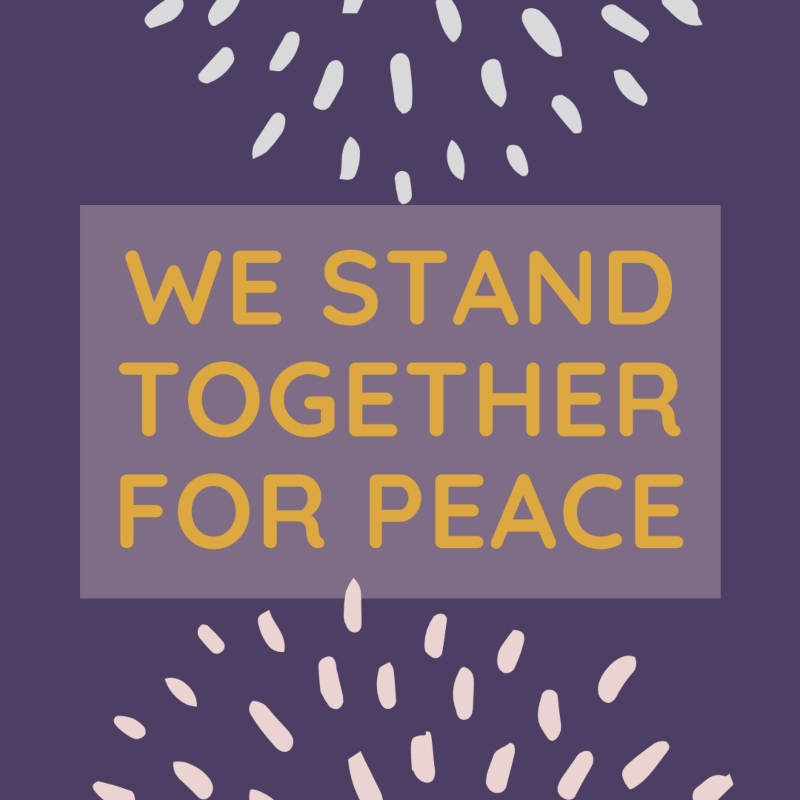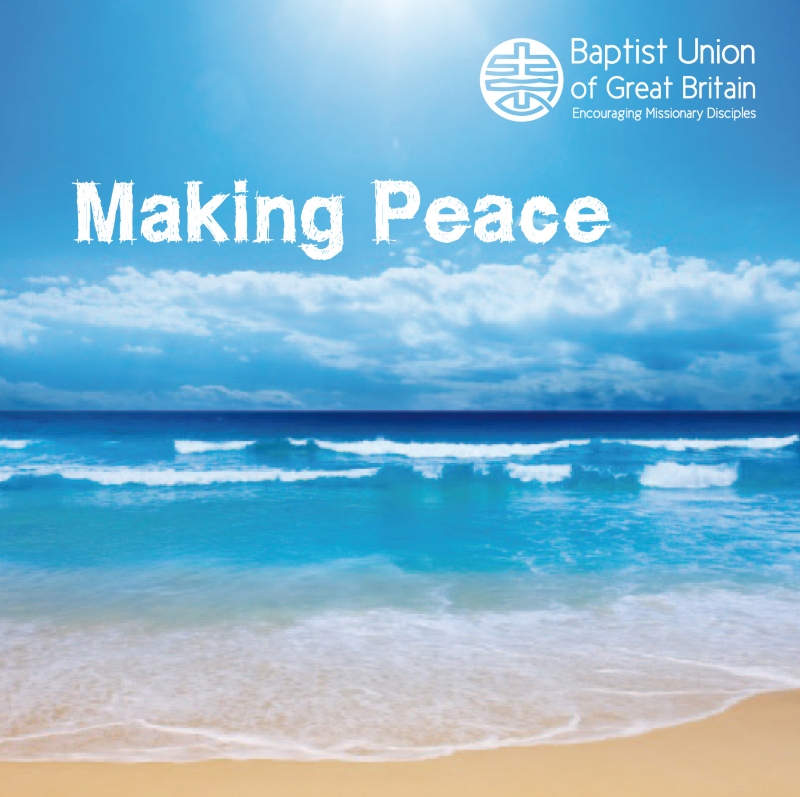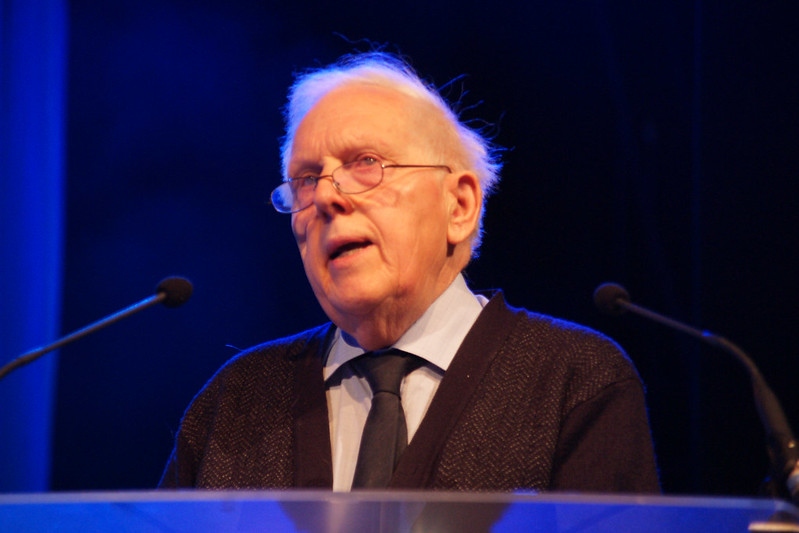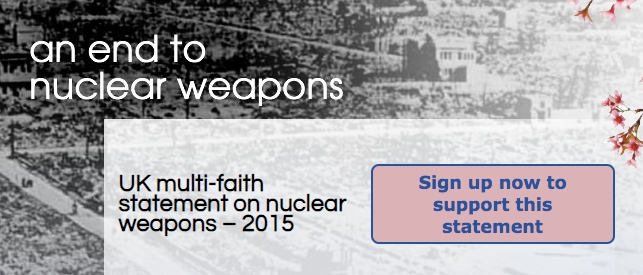The Baptist Union and the nuclear weapons debate
As the United Nation’s “Treaty on the Prohibition of Nuclear Weapons” becomes international law, Steve Tinning highlights our journey towards a call for nuclear disarmament
 “Blessed are the peacemakers for they shall be called children of God” Matt 5:9
“Blessed are the peacemakers for they shall be called children of God” Matt 5:9
Peace is very much the will of God and therefore the calling of all Christ’s followers. I trust this is not a controversial statement. However, a debate has rattled on for decades as to how peace can best be realised. On the one hand you have those who might argue the UK’s nuclear deterrent and related strategy of “mutually assured destruction” paradoxically ensures peace in an unstable world.
On the other, you have those who cannot reconcile the existence and continued development of thousands of nuclear weapons, each capable of killing millions of people, with the hope of peace. We all have a responsibility to figure out where God would have us stand along that line.
Of course, over the years, Baptist Christians have expressed a variety of views from a number of different perspectives. However, in recent years there has been a notable trajectory towards the condemnation of the UK’s ongoing development of nuclear weapons.
This week, on the eve of the United Nation’s “Treaty on the Prohibition of Nuclear Weapons” becoming international law, I wonder, in fact I hope, we as Baptists Together might be ready to say – the time has come for the UK to put the days of nuclear weapons behind us and lead the world (or the nine nuclear states at least) towards disarmament.
Let me briefly outline some of the headlines in recent years.
2006
In 2006, parliament debated the renewal of the UK’s Nuclear deterrent, Trident. This reignited the nuclear weapons debate throughout the whole of society, including communities of faith. Baptist Union Council took this subject very seriously. It consulted widely and discussed the question at length, considering numerous political, theological, economical and moral issues along the way.
One particularly helpful contribution came from the members of Abbey Road Baptist Church in Barrow-in-Furness, who themselves were divided by opinion on the nuclear debate, but united in the hope for peace. Their unique perspective was that their town would be dramatically impacted by an end to the UK’s nuclear investment as the submarines were built in their docks. The livelihoods of thousands in their community depended on these government contracts.
Peace is of course, so much more than the absence of violence: if we are to speak up against nuclear weapons we must also speak up in solidarity with those who face deprivation unless a plan to invest in towns like Barrow is enacted simultaneously.
While the vote was not unanimous, Council passed this resolution:
Council opposes replacement of the Trident nuclear weapons system and urges the UK Government to take leadership in disarmament negotiations in order to bring about the intention of the Non-Proliferation Treaty for the elimination of all nuclear weapons.
 This debate would prompt the then Faith and Unity department of the Baptist Union to produce a resource entitled “Making Peace” to inform local churches on the issues being discussed, and encourage them to pray and speak out for peace. Its message was clear:
This debate would prompt the then Faith and Unity department of the Baptist Union to produce a resource entitled “Making Peace” to inform local churches on the issues being discussed, and encourage them to pray and speak out for peace. Its message was clear:
“As Christians we all want to see changes that will lead to a fairer and more peaceful world for everyone.
For us as individuals to influence decisions taken on the world’s biggest issues is not only desirable, it’s realistic, it’s achievable, it’s something we can all pursue through prayer in our local churches and also by engaging in the debate in the highest political level.
Because faith and hope, however important, are not enough – strong beliefs have a strong voice if they’re going to make a difference – and we have that voice.”
Of course in 2006, Parliament voted to renew Trident and the process of developing new submarines and new warheads now under way.
2010
In 2010, the UN held a review conference for the parties to the Treaty on the Non-Proliferation of Nuclear Weapons (NPT), of which the UK is one. NPT is a treaty whose objective has been to prevent the spread of nuclear weapons and weapons technology and to further the goal of achieving nuclear disarmament and general and complete disarmament.
In recognition of the limited impact the treaty was having towards disarmament, a discussion was held at the Baptist Union Assembly and another resolution ratified. This time we said:
Recognising the continuing threat to peace posed by the existence and development of nuclear weapons… this Assembly:
-
affirms its commitment to uphold the vision of a world free of nuclear weapons.
-
calls upon the UK Government to join with others in taking courageous steps to strengthen the non-proliferation regime and build a secure future for all.
-
calls upon churches to give support to the ‘Now is the time’ campaign.

Professor Norman Kember seconding the public resolution on nuclear weapons at the 2010 Baptist Assembly. The resolution was proposed by the Revd Dr Craig Gardiner.
2015
That ‘Now is the time’ campaign, led by the Joint Public Issues Team, culminated in a statement signed in 2015 by the leaders of 26 faith movements and published in national press, saying,
…it is clear that there is now a shared conviction that we must work out the path to the elimination of nuclear weapons.

2017 - current day
In 2017, in recognition of how ineffective NPT was being in its objective to drive the world towards disarmament, the United Nations adopted a new treaty, the “Treaty on the Prohibition of Nuclear Weapons” (TPNW). This treaty is the first legally binding international agreement to comprehensively ban nuclear weapons with the ultimate hope being their total elimination.
Once again, many Baptist churches spoke out in support of this treaty and will be delighted to hear that it’s entering into force on 22 January 2021, having received the 50 nation signatures required.
The sad news is that none of the nine nuclear states, including the UK, have signed the treaty and show no intention of recognising it in the near future. So once again, those who have made such inroads in nuclear disarmament – seeing the number of nuclear weapons in the world drop by around 75 per cent over the last 30 years – are listening to hear whose voices are speaking with them.
Martin Tiller, member of Rugby Baptist Church and a member of the Executive Committee of the Christian Campaign for Nuclear Disarmament, has written an excellent reflection that I’d commend to you which begins with the words of the old time Sunday School favourite, “My God is so big, so strong and so mighty, there’s nothing that He cannot do.” Martin asks us to consider whether we believe this to be true.
There is no doubt that the path to a world free of nuclear weapons is ambitious indeed, but surely we believe in a God who is able to do immeasurably more than all we can ask or imagine? Only, it would appear that as in so much of His miraculous involvement in the world, God chooses to use us to bring about his purposes. It is according to his power at work in us that so often we see God restoring his creation.
My hope is that as Baptists, together we might pray earnestly, speak prophetically and act strategically, as we call on the UK government to pursue constructive dialogue with the many governments who support the Prohibition of Nuclear Weapons Treaty, and strive for a just and genuine peace.
Local churches can make a difference, we do have a voice, and when it is spoken alongside others it can reverberate into the very places of power that can make a difference.
-
Please pray – for our world to pursue peace in movements of humility and courage instead of dominance and fear.
-
Our General Secretary, Lynn Green, has contributed to an interfaith video statement in support of the UN’s Treaty on the Prohibition of Nuclear Weapons this week. Please watch out for it on social media, and share it widely.
-
Please write to your MP, asking them to welcome the “Treaty on the Prohibition of Nuclear Weapons” and encourage the UK government to sign it in the near future.
-
Write to your bank or pension provider and ask them to disinvest your money from nuclear weapons.
The Revd Steve Tinning is minister of Leigh Road Baptist Church, Essex and member of the Faith & Society Team
Related
Do we have enough hope? The first legally binding international agreement to ban nuclear weapons enters into force on 22 January 2021. None of the nine nuclear states, including the UK, have signed the treaty. Martin Tiller explains how the church can bring about change
Do you have a view? Share your thoughts here.
Baptist Times, 20/01/2021